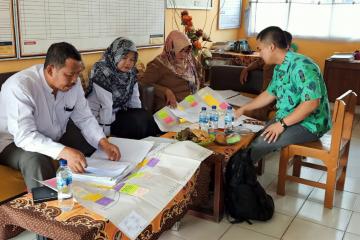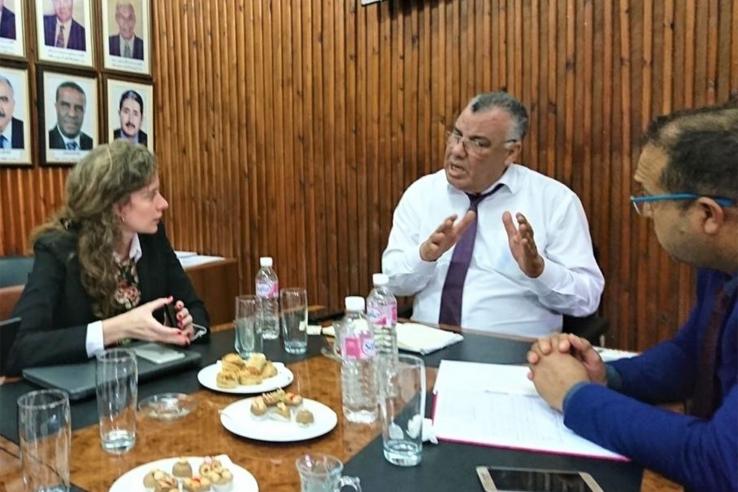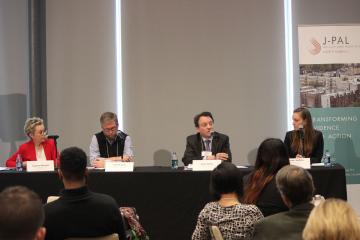
Juliette Keeley, J-PAL ’18, on navigating the international development ecosystem

The Alumni Spotlight series highlights J-PAL alumni who are making an impact across industries and around the world. To nominate a J-PAL alum to be featured in a future Alumni Spotlight, please fill out this form.
In the next installment of our Alumni Spotlight series, we speak with Juliette Keeley, a former senior policy associate at J-PAL North America and later a West Africa policy consultant for J-PAL. While at J-PAL, she worked with state and local policymakers in the United States to catalyze and support randomized evaluations, and supported the evaluation and scale-up of Teaching at the Right Level in Ghana. Now a manager at Instiglio—a nonprofit consultancy focusing on results-based financing and performance management in developing countries—she reflects on her experiences working in development policy across the United States and West Africa.
What drew you to the field of development? Tell us a bit about your background and what you were looking for in a career.
I was first drawn to studying the impacts of anti-poverty programs based on a volunteering experience in India when I was 17. While in college I focused more locally, volunteering in public schools on the south side of Chicago. I wanted to dedicate myself to service for some time after college, so I joined the Peace Corps and ended up being a math teacher in Guinea in West Africa.
There, I witnessed many inequalities and became even more interested in ways to address the root causes of issues that I was seeing: girls dropping out of school, low test results, and few formal jobs or pathways out of poverty. This made me question whether development actors were really investing in the right things.
My next step after that was to think about community development, so I turned to the New York City Department of Education, the largest education district in the US which serves over 1.1 million students. There, I worked on student assessments and school quality evaluations, which entailed evaluating a subset of principals among the more than 2,000 public schools in New York City. This drew me to the field of rigorous impact evaluation. I went to graduate school to pivot back into development, where I learned about J-PAL and its work in rigorously evaluating social programs. This exposed me to the evidence-based policymaking ecosystem and its backbone of incredible researchers, which seemed like exactly what I had been looking for.
You started at J-PAL as a senior policy associate in the North America office. Could you tell us about that role?
I started as a senior policy associate at J-PAL North America, where my role mainly entailed interfacing between researchers, economists, and policy officials in Santa Clara County and King County on the West Coast regarding issues of housing and homelessness. I worked on the State and Local Innovation Initiative, where state and local officials can apply for funding with a policy idea in mind and be matched with researchers in our network.
That work culminated in running the Year 2 Convening for the State and Local Innovation Initiative in Santa Clara County, which brought together innovative state and local officials, directors of research and evaluation from government departments, and service provider heads from across the country to talk about the use of evaluations and data to improve decision-making and policy design. This role necessitated a keen understanding of stakeholder needs and constraints to advance the use of rigorous data in policy making.
You then shifted to working for J-PAL Africa as a policy consultant. Could you tell us about that transition?
I've always been interested in both US policy and international development policy. I heard that the Africa office was working on scaling this very exciting educational approach, Teaching at the Right Level (TaRL), pioneered by the Indian NGO Pratham and evaluated by J-PAL over the course of 15 years. It seemed like an incredible opportunity to scale a promising intervention and work at the forefront of research implementation and policymaking. In this role, I worked mostly in Ghana with officials from the Ministry of Education to support the RCT of a TaRL-like approach in 200 public primary schools, but I also explored partnerships with government officials and education NGOs in Senegal and Niger.
What were some key insights about scaling up education programs from working with TaRL Africa?
It’s crucial to understand the local ecosystem and the different incentives that exist for major stakeholders, including what has been tried before. An adaptation of TaRL delivered through teaching assistants had been evaluated by IPA in 2013 in Ghana, but had not sufficiently included the Ministry of Education in the initiative’s design. In 2018, the Ghana Ministry of Education adopted the basic approach of TaRL, but proposed a curriculum which was not exactly the model so rigorously evaluated in India.
It was important to enter that space with humility, not assume that people didn't know the evidence or understand the model, but try to understand why the government was taking a different approach this time. Children's education had become an incredibly political issue for Ghana at the time, which increased the complexity of scaling the program according to the very technical requirements of the model. There was great pressure for the government to show results fast in improving historically low primary school learning levels. This could conflict with the approach of researchers, who may have more time and resources to conduct a rigorous evaluation. My role, and the role of IPA and J-PAL, was to find ways to convince politicians under incredible political pressure that it would be best to wait for the rigorous results of the RCT before scaling the TaRL-like approach.
Could you tell us a little bit about your current role at Instiglio?
Instiglio is a nonprofit consultancy whose mission is to improve the impact of social programs in developing countries through the use of results-based financing (RBF) and performance management. I see my role as building upon what I did at J-PAL, this time focusing on the demand-creation side of evidence. We work with interested governments and international development donors such as MCC, DFID, and USAID to ensure that every dollar spent on social programs is producing or incentivizing results.
At Instiglio, I have both an operational and a managerial role. As acting office head, I helped launch and scale our Kenya office, and I now work on building the team for our latest office in Morocco. As project manager, my work has focused mostly on poverty alleviation and workforce development. This includes engaging with the Government of Kenya to build an outcomes fund focused on poverty alleviation (based on the success of a previous bond), and advising the Government of Tunisia and the Millennium Challenge Corporation (MCC) on how to improve the performance of port workers using RBF.
Now, I work primarily on our engagements with the MCC and the Government of Morocco on improving the impact of employment programs across multiple government agencies. In partnership with the Moroccan Ministry of Labor and the National Employment Agency, we’ve launched the country’s first employment RBF program with eight service providers who are delivering employment services to vulnerable youth and women in Morocco. They aim to place at least 4,000 people in jobs over the next 15 months and retain at least 3,000 of those in jobs for at least six months.
Those service providers will only receive full funding if they are able to achieve verified placement and retention results. To pay service providers, we check the results they claim against government administrative data, which allows us to tell whether program participants are actually obtaining formal jobs. This approach makes our program truly embedded in existing government systems and increases the likelihood of sustainability.
We launched right before the pandemic hit, so many service providers have had to completely shift their interventions. RBF has been very appropriate for this situation, as it differs from traditional funding in that activities of service providers are not prescribed. This has allowed providers to adapt to the crisis by moving their programs online and adjusting in-person trainings.
What advice would you give to those who are interested in pursuing a career in evidence-based development work?
There are many meaningful ways to work in the development space ecosystem. For example, you can work for impact-driven service providers, innovative units within government, or within donor agencies or multilaterals particularly focused on either evidence generation or innovative approaches to development. There are also many small consultancies and organizations focused on innovative approaches to international development, such as Instiglio.
What’s important when figuring out what position you want is to understand what role an organization plays in the greater ecosystem. Once you settle on an organization, think about what role you want to have within that organization. Don't get stuck on finding the perfect job. Think more about what long-term impact you want to have and what skills you want to build towards that goal. Approach your career as more of a continuum, where each experience helps you build skills and learn about different contexts and stakeholders, with the humility and curiosity that there is always more to discover.
Related Content

Patrya Pratama, J-PAL ’15, leverages his policy experience to build an education nonprofit

Adrien Bouguen, J-PAL ‘12, on his path from research assistant to assistant professor



